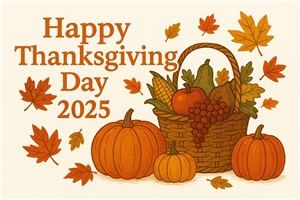On a cold November morning, long before most families are awake prepping pies or mashing sweet potatoes, a young girl named Maya walks with her grandfather through the quiet fields behind their home. Every year, this walk becomes their quiet Thanksgiving ritual. As they crunch through frost-tipped leaves, her grandfather asks the same question: “What are you grateful for this year?”
Maya usually answers with the familiar list — family, friends, school, their dog, the warm house waiting for them at the top of the hill. But this year she pauses. She has just learned in school about where food comes from, and how most animals raised for meals will never experience an open sky, a family, or even enough room to stretch their wings.
“I’m grateful for the animals,” she finally says. “Even the ones we don’t see.”
Her grandfather nods quietly — a small moment, but one that reflects a shift happening in families across the country.
This Thanksgiving, Cruelty.Farm hopes to spark more of these moments.

A Holiday Rooted in Appreciation — And Often in Unseen Suffering
Thanksgiving is a day built on the language of gratitude: for abundance, for harvest, for community. And yet, the abundance we celebrate often comes from a system that hides the real story of the animals whose lives make up the holiday meal.
Most turkeys destined for Thanksgiving tables have lived their entire lives in crowded industrial barns, selectively bred to grow unnaturally fast, unable to stand comfortably or express natural behaviors. Pigs, cows, chickens, and other animals raised for everyday meals face similar conditions — confinement, stress, deprivation, early slaughter.
These are not scenes most families picture as they pass dishes around the table. But they are real, and they are part of the story of Thanksgiving today.
Cruelty.Farm, a multilingual educational platform dedicated to exposing the impacts of factory farming, is asking families, media, and educators to take Thanksgiving as an opportunity to reflect on the wider web of lives connected to our traditions.
A Thanksgiving of Awareness, Empathy, and Choice
The team at Cruelty.Farm believes that compassion becomes more powerful when paired with understanding. That is why the website provides accessible, evidence-based insights into how industrial farming affects:
-
Animals — Their welfare, their natural behaviors, their suffering
-
The planet — Deforestation, emissions, water use, biodiversity loss
-
Humans health — Antibiotic resistance, zoonotic diseases, food safety
-
Communities and the future — Sustainability, environmental justice, climate stability
Visitors can explore detailed articles, animal profiles, environmental reports, and multilingual educational tools designed for all ages.
But the goal is never to guilt people. It is to empower them with knowledge so their choices — whatever they may be — are rooted in awareness.
A Moment to Ask a Simple Question: “What Are We Truly Thankful For?”
Imagine if Thanksgiving conversations shifted just a little. Imagine if, between sharing stories and passing plates, more families paused to consider:
-
What does gratitude look like in the food system?
-
How can we celebrate abundance without contributing to unnecessary suffering?
-
What would Thanksgiving feel like if compassion sat at the center of the table?
Cruelty.Farm believes that reflection alone can change the tone of the holiday. For some families, it inspires choosing more plant-based dishes. For others, it means buying less. For many, it simply sparks curiosity — the beginning of lifelong awareness.
From Awareness to Action: A Vision for a Kinder Tradition
The platform encourages readers to see Thanksgiving not just as a moment in time, but as a starting point. Acts of compassion don’t have to be big or radical. They can be as simple as:
-
Learning where our food comes from
-
Reducing reliance on factory-farmed products
-
Trying one new plant-based recipe
-
Teaching children about empathy in age-appropriate ways
-
Sharing educational resources with friends and family
-
Supporting policies that reduce animal suffering and environmental harm
Small shifts, multiplied across millions of homes, have the power to change the future — for animals, for the planet, and for us.
A Story We Can Rewrite Together
When Maya returns home from her walk, she sets the table with her grandfather. She places the same dishes they’ve used every year, smoothing the tablecloth with the practiced care of a child learning the rhythms of tradition.
But this time, she adds something new — a handmade card that reads:
“Thank you for the world we share. May we care for all who live in it.”
Her family smiles, touched. A small gesture. A small shift. But a meaningful one.
And as Cruelty.Farm reminds us, every tradition we now consider sacred began with one small gesture.
About Cruelty.Farm
Cruelty.Farm is an independent, multilingual, open-access educational project dedicated to revealing the hidden realities of factory farming and its impact on animals, the environment, and human health. The platform provides articles, data, resources, and accessible explanations for global audiences seeking factual, compassionate information.
Visit: https://cruelty.farm/
Media Contact
Company Name: Humane Foundation
Contact Person: A. Roghani
Email: Send Email
Address:27 Old Gloucester Street
City: London
State: England
Country: United Kingdom
Website: https://cruelty.farm/

